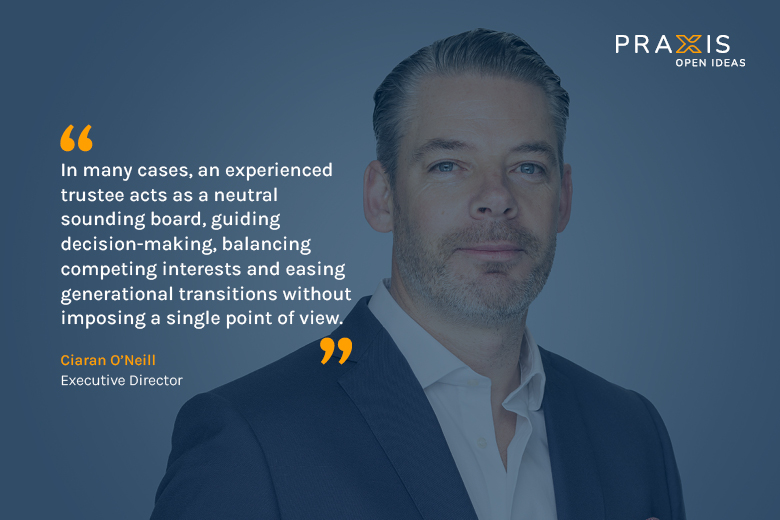
The third generation challenge: practical strategies for the modern wealth-owning family
As wealth becomes more global and family structures more complex, preserving it beyond the third generation is no longer just a matter of good governance but requires a deeper understanding of family dynamics.
In this Q&A Ciaran O’Neill Executive Director at Praxis in Guernsey, draws on decades of experience with international families to share his perspective on the evolving dynamics of modern family wealth.
Why do so many families struggle to maintain their wealth beyond the third generation?
The challenge is rarely financial - it is strategic and behavioural. As families become increasingly global and mobile, maintaining a shared vision for the future can become more difficult.
Wealth can end up enabling individual freedom rather than supporting collective purpose, which can lead to fragmentation over time, along with rising financial demands and, ultimately, the erosion of the asset base. Without early planning, financial education and clear cohesion across generations, families can lose sight of what the wealth is for – making long-term preservation more challenging to achieve.
Are there common financial or behavioural patterns that contribute to this?
While every family is different, recurring patterns can make long-term wealth preservation challenging. It is common to see a single generation or siblings or cousins split - some may be deeply involved in operational businesses, while others focus on personal or philanthropic goals.
Principals are increasingly recognising this and taking a more modern, flexible approach to legacy planning that acknowledges and supports the individual ambitions of future generations. Rather than insisting on a single path, we see families creating structures that give room for everyone’s goals while still holding onto a shared framework. This shift from control to stewardship helps families remain connected, even as their interests and geographies evolve.
Are there specific strategies to combat this, and any modern strategies or tools that can help preserve wealth?
There are proven strategies to help families preserve wealth across generations. No matter how complex the structure or large the asset base, the simplest approach is often best. Identifying the main stakeholders and maintaining regular, structured communication is key. This can be difficult given external business and family commitments, but it is essential to long-term harmony.
One tool that can help is the creation of a family charter or constitution. By documenting a family’s values, principles, and vision, and setting out how decisions will be made, a charter provides a flexible but steady framework that can guide the family over time - helping to avoid misunderstanding and conflict as generations and priorities shift.
Alongside this, strong governance, succession planning, and education remain fundamental. A well-managed family office can bring these elements together, providing continuity, clarity and cohesion - helping to ensure that the family’s priorities remain aligned, even as individual paths and interests begin to diverge.
Trusted advisers, including trustees, can play a vital role as independent mediators, helping to manage differing perspectives before they escalate into conflicts. A trustee who understands the family's dynamics and who has both the sensitivity to facilitate dialogue can help preserve relationships as much as assets. In many cases, an experienced trustee acts as a neutral sounding board, guiding decision-making, balancing competing interests and easing generational transitions without imposing a single point of view.
Selecting the right trustee is therefore critical. Beyond technical expertise, families increasingly look for trustees who can support soft governance - helping to maintain alignment of values, resolve potential tensions early, and encourage stewardship skills in younger generations.
Families are also embracing alternative structures beyond traditional trusts. Private trust companies, Family Investment Companies (FICs) and foundations can offer greater flexibility and control, allowing structures to evolve in line with changing family needs - whether that means business exits, new entrepreneurial ventures, or philanthropic ambitions.
Education is equally crucial. Structured programmes such as family academies, mentoring schemes, or internships within family businesses or foundations help prepare the next generation for their future roles. Importantly, these initiatives focus not only on financial literacy, but on building the broader stewardship skills needed to manage and lead across generations.
What advice would you give to those wishing to protect their wealth beyond the third generation?
Clarity of purpose is key. Establishing a portion of the structure with a clearly defined mandate - such as long-term capital preservation - can act as a financial anchor. Involving the next generation early, particularly through structures like charitable trusts or private trust companies, or foundations, helps build understanding and engagement.
By giving younger family members exposure to both the responsibilities and possibilities that come with wealth, families can ensure that each generation grows into its role, not just as beneficiaries, but as thoughtful custodians of the legacy they will one day be responsible for continuing.
Find out more about our Private Wealth services or contact Ciaran.
Selected quotes from this article were first published in ‘How wealthy families can survive the third generation curse’ on thewealthnet in April 2025.
PraxisIFM Trust Limited is regulated by the Guernsey Financial Services Commission and licensed as a fiduciary and corporate services company.
Please note that this article is intended to provide a general overview of the matters to which it relates. It is not intended as professional advice and should not be relied upon as such. Any engagement in respect of our professional services is subject to our standard terms and conditions of business and the provision of all necessary due diligence. © Praxis 2025

